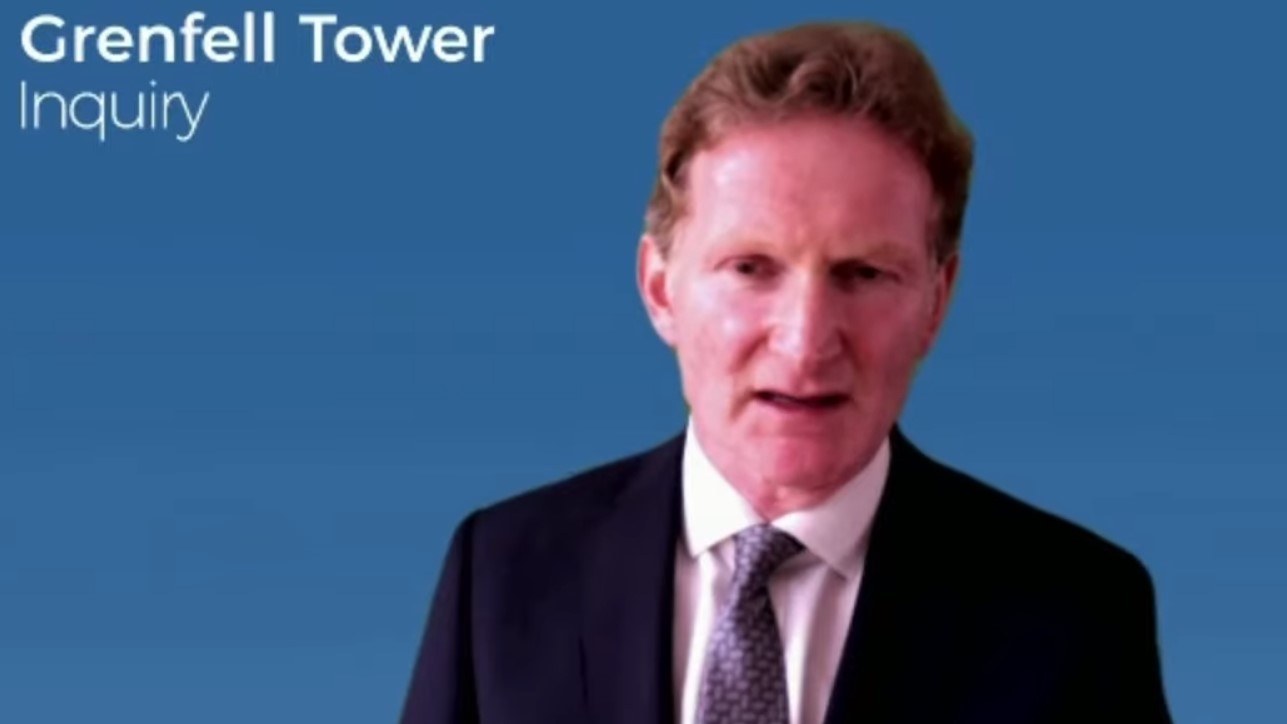Grenfell: BBA reported Arconic suspicions to Met Police

The British Board of Agrément (BBA) reported its suspicions that it may have been misled by Arconic to the Met Police, the Grenfell Tower Inquiry has heard.
This followed protracted attempts to obtain fire test data for the Reynobond 55 PE cladding used on Grenfell Tower, which failed to yield results.
Former BBA deputy chief executive Brian Moore was giving evidence to the Inquiry for a second day yesterday (17 March), much of which centred around information uncovered by a BBC investigation into fire tests on the product that produced classifications that conflicted with its BBA certificate.
Register for free or sign in to continue reading
This is not a paywall. Registration allows us to enhance your experience across Construction Management and ensure we deliver you quality editorial content.
Registering also means you can manage your own CPDs, comments, newsletter sign-ups and privacy settings.
The Inquiry heard how BBC journalist Tom Symonds sent an email to the BBA on 19 February 2018 to reveal that he had uncovered a series of classification reports commissioned by Arconic between 2011 and 2015, with testing done by the CSTB in France. Symonds pointed out that in only one of the tests, in February 2011, did Reynobond PE achieve the B European rating shown on the product’s BBA certificate. In two subsequent tests, the product was rated E in rivet and cassette form, and in another two it was rated C in rivet form.
Moore forwarded the documents to BBA colleagues, including former project manager Valentina Amoroso who had overseen a 2015 BBA review of the product, and commented: “There would seem to be quite a few [tests] that we are unaware of”.
'Troubled'
Moore told the Inquiry he was “troubled” by the reports that the Reynobond 55 PE cladding in both rivet and cassette variants had achieved classifications different from the BBA certificate.
He added: “I was very concerned, and the potential for the BBA having been misled, that was certainly in my mind now: well, how could this happen? And also, of course, that the BBA had misled or could be misleading users of the certificates were, you know, weighing on my mind at this time.”
Asked if the BBA considered suspending Arconic’s BBA certificate, Moore pointed out that the certificate in respect of PE had already been withdrawn by that stage because it was no-longer in use, but that there was still a certificate for the product with a fire-resistant (FR) core.
Commenting on receiving the documents from the BBC, Moore said: “There is no doubt that I had suspicions that we had not been given the full picture, but this was not conclusive in its own right. My approach and my strategy was: only if it comes from Arconic or only if it comes from CSTB would it be solid.”
Arconic 'evasive'
As a result, Moore began correspondence with Arconic over the matter. In February 2018 he noted to colleagues that during a call with Arconic director Claude Schmidt, Schmidt “was more interested in the BBC and how we were going to handle inquiries than the substantive matter of whether the BBA had been provided with the current data about the fire rating of Reynobond PE."
He went on: "I felt that he was somewhat evasive − having to refer matters to his ’Board’ − so I have given him a week to respond as to what the CSTB fire ratings were and why we [were] not told if they were different to our Cert value.”
But Moore did not reveal to Schmidt that it had the CSTB reports in its possession, following the BBC's investigation.
Asked why not, Moore said: “I knew that with such a terrible tragedy that had unfolded, there would be the police and there would be this Inquiry coming very soon, and I was not going to affirmatively alert Mr Schmidt and co about stuff that they may use potentially to their advantage. So, yes, this was my conscious approach. It was either going to be from CSTB or from Arconic, and this other information was helpful intelligence , but it was not definitive unless it had come from Arconic.”
Ultimatum
Moore then wrote an email dated 23 February 2018 giving Schmidt a week to provide details of fire test data relating to the Reynobond PE product, which the BBA did not believe it had received. Moore warned that if Arconic did not clarify the position in respect of the fire rating from the various CSTB reports, the BBA would “have to consider whether we continue to have confidence in other certificated products/systems”.
Schmidt replied stating that the BBA had been provided with the opportunity to become aware of any changes to the Reynobond PE core and suggested Moore speak to his lawyer at law firm DLA Piper “to avoid any problems”. Moore suggested in a witness statement given prior to the Inquiry hearing that the response from Schmidt “stopped short of saying that we had been informed”.
Moore then had an informal meeting with a lawyer from DLA Piper on 5 March 2018.
Lead counsel to the Inquiry Richard Millett QC asked Moore: “Is it right that, summarising what happened after that, 5 March 2018, that despite further requests from you in March and April 2018, neither Arconic nor DLA Piper, its solicitors, ever sent you the full suite of test reports or classification reports for PE or FR Reynobond 55?”
Moore said: “I certainly saw nothing about PE, and I did receive a bundle of FR, having chased and chased and chased, which is what I then sent off to the Inquiry, because I understood the Inquiry hadn’t seen those.”
Millett asked: “Did there come a time when you wondered why it was that you received FR but no PE material?”
Moore replied: “As time went on, my suspicions were aroused. There was something seriously amiss about the PE and the fire classifications . That was the only conclusion I could draw about this.”
Millett asked: “Given your suspicions, why did you not write a formal letter to Arconic demanding that, in compliance with their contractual obligations, they turned over to you all relevant test data and classification data for Reynobond 55 in PE and in FR right the way back to 2008 and before that, when the certificate was being drafted?
Contact with the police
Moore said: “Well, by this stage, into April, I had made numerous requests. I don’t think it could have been clearer what I was looking for, and I was taking legal advice about how to proceed.
"Then it got to the point in April where I was pleased when we were contacted by the Metropolitan Police Service, the first authority or agency that approached us, and I made my disclosure about my suspicions to the detective who came to see us and expected the Metropolitan Police to take this forward. I was really quite seriously concerned about what may be going on in the background, and I think it required a more formal investigation than I think the BBA could sustain.”
Asked why the BBA not take action then, Moore added: “What action? The PE had been removed from the certificate, the FR certificate was still extant, and I was taking legal advice about that position, as to whether that should continue.”
He said that it was when a report by expert Dr Barbara Lane released on November 2018 containing “other material that we hadn’t seen” was released that the BBA suspended and withdrew the certificate for FR.
Questions over speed of action
Asked why the BBA didn’t do this earlier, Moore said: “Personally, I would have liked to have done that sooner.”
Millett replied: “Well, you say: ‘Personally, I would have liked to have done that sooner’; you were, I think by this time, deputy chief executive officer of the BBA, weren’t you?”
Moore responded: “Yes, I was, but, as I say, I was taking legal advice about the situation.”
Millett asked: “Do you accept that in acting only to suspend the certificate after 2 November 2018, the BBA acted in a way that was supine and leaden−footed?”
Moore replied: “No, I don’t accept that at all. I don’t think that’s a fair description. I spent a great deal of time trying to put pressure on Arconic to the best I could to acquire this information. I don’t think it is fair or accurate to describe the BBA’s approach in that way. We had taken legal advice from the time the BBA(sic) contacted us and were trying to be proportionate.
"But I never ever was supine or leaden−footed −− well, leaden−footed is a matter of opinion. I never felt supine towards trying to get information from Arconic that I thought we needed.”
The Inquiry continues.











